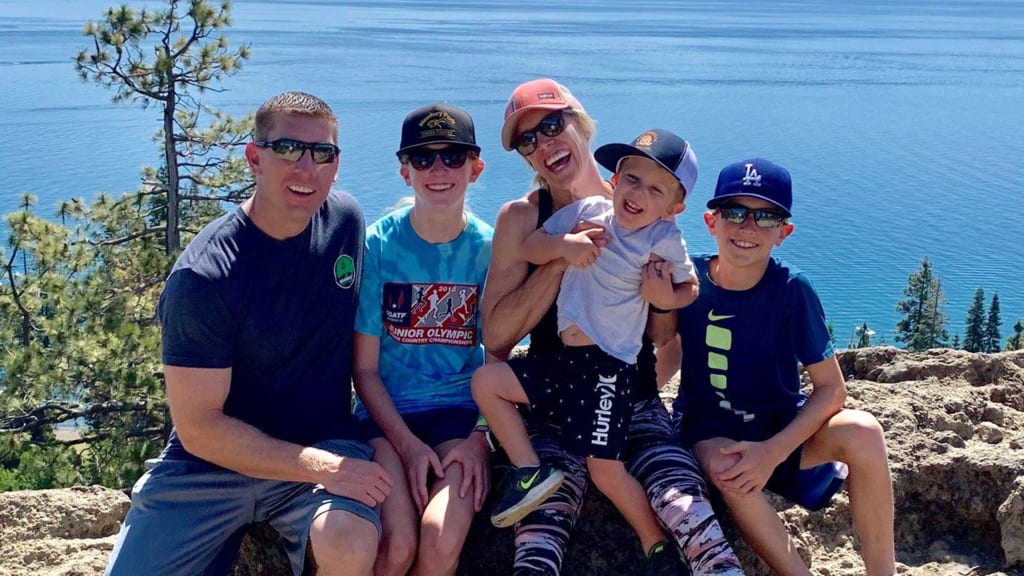
CHICAGO -- It has been almost 20 years since the White Sox selected Joe Borchard with the 12th pick overall in the 2000 MLB Draft, picking up who they hoped would be a franchise cornerstone in center field. Even with the two decades of time passed, the 41-year-old Borchard still remembers sitting in his California apartment and taking the call from White Sox general manager Ron Schueler at around 10:15 a.m. PT.
Borchard was an accomplished baseball player at Stanford, having played twice in the College World Series, as well as a burgeoning quarterback on the football team who threw for five touchdowns, 324 yards and ran for 74 more in a 42-32 victory over UCLA. Borchard’s $5.3 million signing bonus -- which represented the highest-ever in baseball history at the time -- took him completely away from football.
Great success was never found by Borchard over 301 big league games, including 102 with the White Sox, as he produced a career .205 average with 26 home runs and 77 RBIs. But one of baseball’s truly good guys has done very well off the field, as the happily married father of three approaches his 17th anniversary with his wife Erin, and serves as the director of sales for Ventura Coastal while living in Newbury Park, Calif. He also coaches eighth grade baseball at Oak Christian School, where one-time White Sox shortstop Royce Clayton is in charge of the program.
During an extended lunch break on Monday, Borchard took some time to talk with MLB.com about his life in this first installment of "Where are They Now?"
MLB.com: How tough was it for you to give up football after the White Sox selected you in 2000?
Borchard: I think what I really wanted to explore when they drafted me was the idea: Could I continue to play football and play Minor League Baseball so I could keep both options going. They really didn’t express any desire to do that, which I don’t blame them for at all.
I had two years of eligibility in football remaining. So, there was still a tremendous amount of unfinished business there as far as I was concerned. I was really just coming into my own as a football player. The progression of baseball seemed to happen much faster when I arrived on campus and that precipitated having the career that I did and the place in which I was drafted in 2000.
At that time, my progression as a football player was really starting to accelerate. Obviously, that was a major contributor into the decision that was made in terms of the offer that the White Sox made and the amount of money I signed for.
MLB.com: Do you regret giving up football?
Borchard: I don’t necessarily regret it. Are there things I would have done differently? Absolutely. Playing the ‘What if’ game can be very, very complicated. It’s not really worthwhile when you get right down to it.
What I try to tell people the most frequently is I’m just extremely grateful I got to do what I did get to do. Did I want to do more? Did I accomplish what I set out to do? No, I did not. I fell extremely short of what I set out to do. I will take 100 percent responsibility for that for falling short in that way. But I don’t regret anything that happened or the way anything went. I just certainly might have done things a little differently at certain points.
MLB.com: What was it like having $5.3 million, especially at such a young age?
Borchard: It’s certainly life changing and it’s something, again, I can’t say enough good things about the organization and the faith they had in me. To do that at that time, and you know based on what they did pay me and then their kind of faith that they put in me, I fell insanely short of what I wanted to do for them. But at the same time, the gratitude I have for [White Sox owner] Mr. [Jerry] Reinsdorf and the entire organization, I can’t overstate that.
MLB.com: Did you go out and purchase anything cool or extravagant?
Borchard: To be honest, I was able to provide a tremendous amount of help to the family. My younger sister [Jill] was going through college at the time. I remember helping my older sister [Julie] and her husband buy their first house. Those things were obviously much more important to me than going out and buying a Mercedes. I’ve never owned a Mercedes. I drive a pickup truck to this day. Really the coolest thing is having the opportunities to do those things and how much gratitude you have for being able to do that is really important.
MLB.com: What ended up really costing you in terms of having a successful Major League career?
Borchard: I thought about that a lot. The biggest challenge is managing the mental part of the game for a lot of players. You see so many guys come through that are tremendously talented, really good players. I really think I had some ill-timed injuries that had a certain impact on things.
Timing is so critical for things to kind of go well, and it never seemed to really time out for me where I would go out and play injury free and have those stretches where you played well, and you solidified yourself. Again, the White Sox provided me with every opportunity. So did the other organizations for that matter. The only regret I really have is not being able to do the things I felt I was capable of doing. I would have liked to have done more certainly.
MLB.com: You do hold the record for the longest home run ever hit at Guaranteed Rate Field at 504 feet against the Phillies (off of Brett Myers on Aug. 30, 2004). Did you know you connected like that upon contact?
Borchard: I remember running to first base and thinking, ‘OK great that’s going to be a home run. That’s exciting.’ And then the thing kept going. I remember seeing it bounce on the concourse up there and just thinking ‘Wow that thing went a really long way.’
That was the first pitch I saw that day. I just remember seeing Brett Myers out there throwing 98 mph and breaking off nasty sliders to guys. I looked at [Jamie Burke] Burkey, who was hitting behind me, and I was in the hole and I said, ‘Dude there’s no way he’s going to get that first pitch fastball by me. I don’t care if I just have to stick the bat out there and have it hit the bat. I’m not going to expose myself to that slider that’s making guys look silly.’
My focus was really just put the ball in play, which probably says a lot about so many things. When you just try to make contact, good things happen.
MLB.com: Explain what you are doing now, work-wise.
Borchard: We supply orange, lemon and grapefruit, tangerine juices and oils to the largest beverage companies in the world: Coca-Cola, Pepsi, Dr Pepper, Starbucks. We sell a million gallons of lemon to Starbucks for them to make their lemonade and smoothies and all these things. It’s one of those recession-proof types of business that I’ve benefited from tremendously from making a decision to do this when I started here eight years ago.
MLB.com: You coach your son (Charlie, who is 11) in baseball. Do they have any idea about your 504-foot homer or your baseball career?
Borchard: They have an idea, but you will always be dad first. What really opens their eyes is when they see an old TV clip that has you on it, then they realize ‘Oh my gosh, you really did play.’
I was cleaning some stuff out of the garage a few weeks ago and I stumbled upon these bats, and I think I had a Frank Thomas bat in there. My son was just like, ‘Wait, you have Frank Thomas’ bat?’ And I said, ‘Yeah, I played with him. I told you this.’ And he said, ‘Oh, yeah, I forgot.’
Every now and then, I’ll have somebody come up to me and introduce themselves and say ‘Yeah, I remember you. It was so much fun watching you.’ Then my son will look at me and say, ‘Daddy, do you know that person?’ And I said ‘No I don’t know him at all. It’s the first time I met him.’ They can’t believe somebody would take the time randomly to say hello. It’s very eye opening for them.
